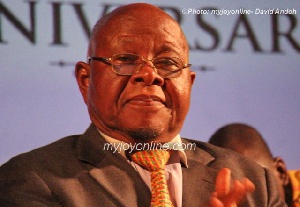Political historian Prof Mike Oquaye, has said no Ghanaian child must be taught in school that Ghana’s first president, Dr Kwame Nkrumah, declared the Gold Coast independent of British rule at the Old Polo Grounds.
The Speaker of Parliament said at the 40th anniversary lecture of former Prime Minister Prof Kofi Abrefa Busia on Tuesday, 28 August 2018, that Nkrumah’s 6 March 1957 “At long last, the battle has ended; and Ghana, our beloved country, is free forever” speech at the Old Polo Grounds, did not amount to a declaration of independence as has been taught for over six decades in Ghanaian schools.
According to Prof Oquaye, that famous speech was a precursor to a rally by Nkrumah’s Convention People’s Party (CPP), adding that it took place before the actual declaration of independence for the Gold Coast in parliament on 6 March 1957.
“That was a CPP rally and Nkrumah was entitled to let his supporters know that the struggle was in fact ended. Independence was declared hours later in Parliament,” he said.
Prof Oquaye said Dr Busia, who was the leader of the opposition in parliament at the time, seconded the independence motion when it was moved on the floor of the National Assembly.
“In this connection, let me say categorically that Nkrumah did not declare independence at the Old Polo Grounds. The motion for independence was supported by Busia and was carried and the Duchess of Kent declared Ghana independent at the National Assembly by the authority of Queen Elizabeth II,” he noted.
The Speaker added that: “No Ghanaian child should be taught that Nkrumah declared independence at the Old Polo Ground”, adding that “never in his [Busia’s] life was he not supportive of Ghana’s independence”.
“I want to use this occasion to remind Ghanaians that when Nkrumah moved the motion of destiny in the National Assembly for independence, it was Busia who seconded it and it was unanimously carried.”
“His role in Parliament was a prophet. He was opposed to the anti-democratic methods adopted by Nkrumah and the CPP, and spoke up against them”, Prof Oquaye said.
General News of Wednesday, 29 August 2018
Source: classfmonline.com













